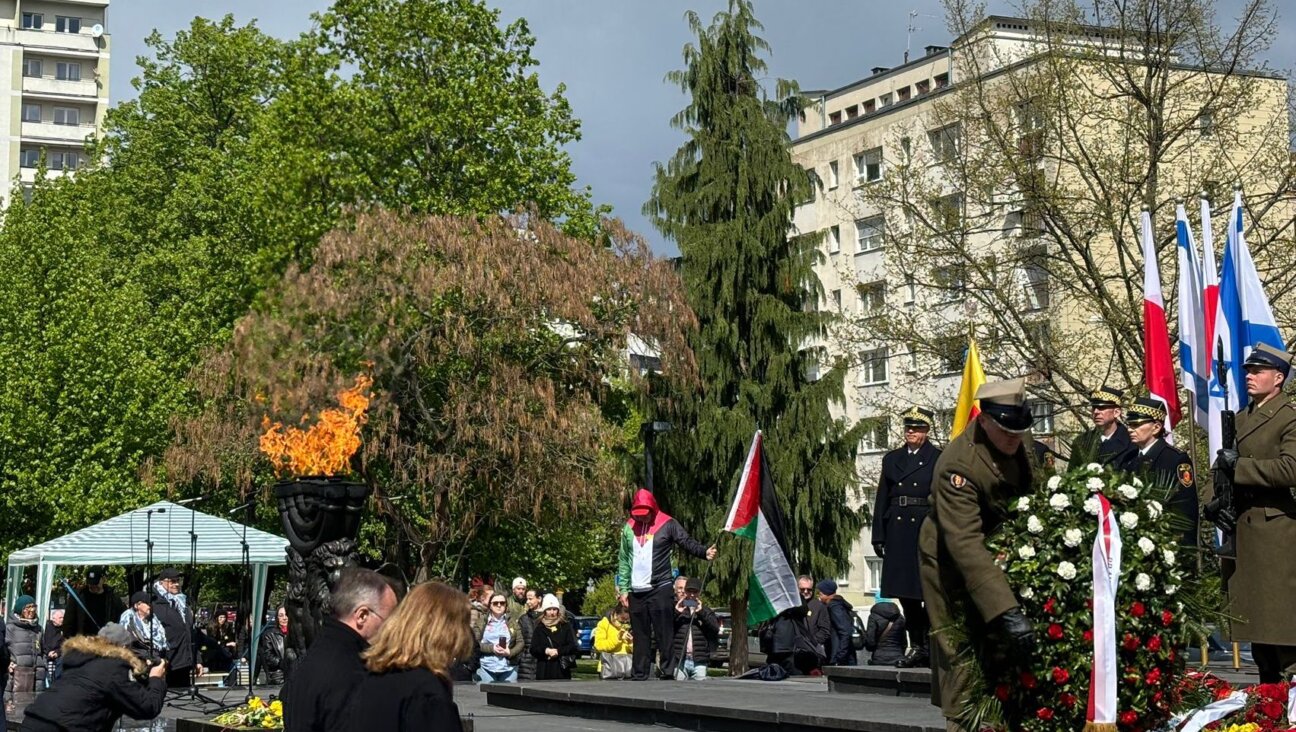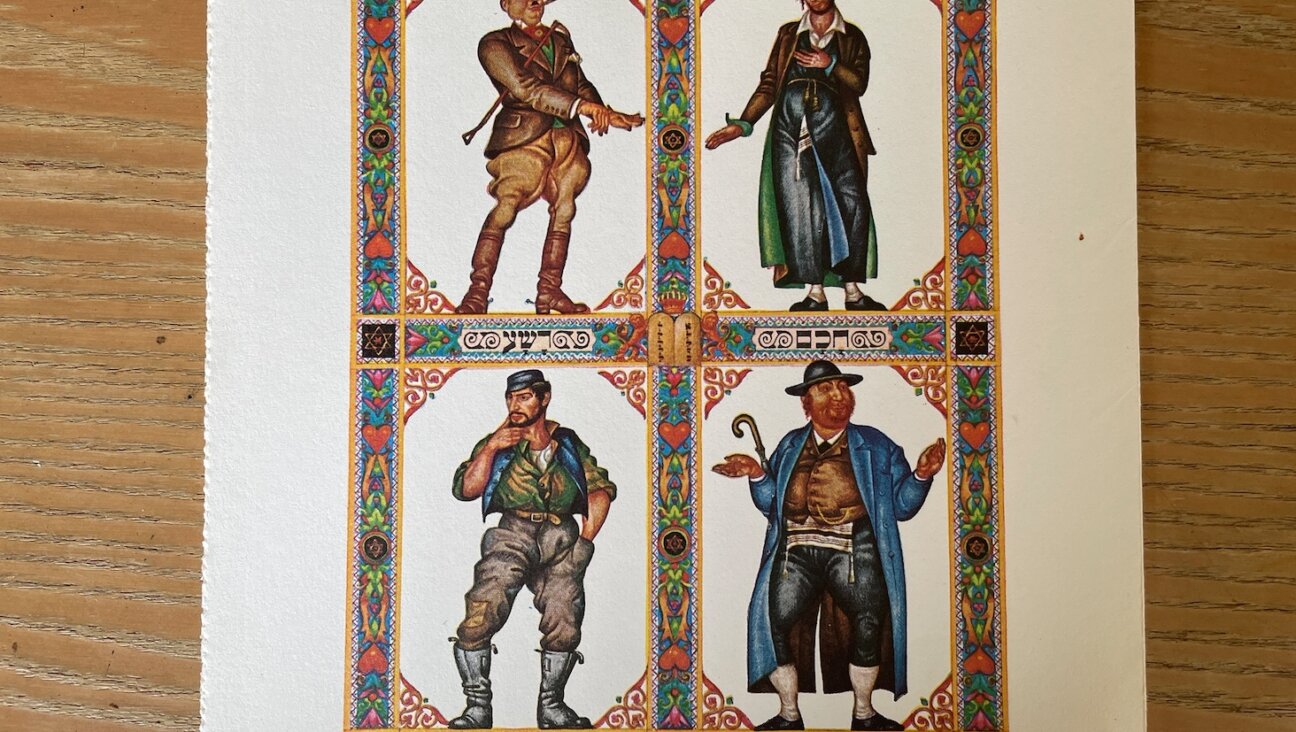Cédric Klapisch and the Legacy of Jewish Humor

Courtesy of Cohem Media Group
It’s been 12 years since French student Xavier (Romain Duris) left his girlfriend, Martine (Audrey Tautou), to move into a Spanish apartment in “L’Auberge Espagnole,” where he met Isabelle (Cécile De France), Wendy (Kelly Reilly) and others and inspired a generation of European students to sign up for the Erasmus student exchange program.
The protagonists were later reunited in “Russian Dolls,” which takes place all over Europe. “Chinese Puzzle,” the third part of the trilogy, brings graying Xavier, now 40, to New York, where Wendy has moved with their two children to live with another man. Isabelle, in a tumultuous relationship with Ju (Sandrine Holt), is also there — and as if life weren’t already complicated enough for Xavier, old sparks are rekindled when Martine comes to visit.
“Chinese Puzzle” opened on May 16 and is a humorous depiction of multicultural, fast-paced, urban life in New York. Director Cédric Klapisch, 52, grew up in a Jewish family in a suburb of Paris and attended film school at New York University in the 1980s. He even refers to New York City as the “fifth actor.” During a visit to New York, which he calls the “capital of Jewish humor” because of Lenny Bruce, Woody Allen and others, Klapisch explained to the Forward’s Anna Goldenberg why he always feels at home on the Lower East Side and how he felt it was his duty, as part of the legacy of the Holocaust, to make comedies.
Anna Goldenberg: “Chinese Puzzle” has so many different themes and interwoven stories. Who was the audience you had in mind when producing it?
Cedric Klapisch: I talked to an American person who worked on the movie, and she said it’s very mainstream. I agree with her in that really anyone can see the movie — maybe even more in America than in France, because it’s talking about New York. It’s true that it’s probably more for urban people than people living in the country. I think there is a big separation now between these two cultures. There’s more [of a difference] between people living in the country, in a small village, and people who live in a city than between French people and American people. Someone very urban in Boston, New York or San Francisco is probably closer to French people living in Paris, Bordeaux or Marseille than to people living in Arkansas.
You lived in New York when you attended film school at NYU in the 1980s, and again while you were shooting “Chinese Puzzle.” Since you come from France, how did you experience Jewish life in New York?
The thing is, I feel I’m really Jewish even though I’m not religious. My grandparents had a store in Rue des Rosiers, the Jewish neighborhood in Paris, and they sold smoked salmon. For me, when I go to places like Russ & Daughters, it’s so much like my family that — even though I’m not a New Yorker — there’s something very strong about that Jewish neighborhood. Also, when I was a student here, I would go to Hester Street, Orchard Street, and it was still very Jewish at that time. It’s just that you can go anywhere in the world, but when you go to a Jewish neighborhood, you feel at home somehow.
You have a very diverse sense of humor. Who would you consider to be the strongest influence on your humor?
I think it’s between Groucho Marx and Woody Allen. I loved the Marx Brothers when I was young. I was constantly seeing their movies. For me, their craziness is so intelligent; it’s not only making fun. And for me, Woody Allen invented intellectual humor. Before Woody Allen, no one was funny and intellectual. He is both, which means that you can be profound and serious and funny. He’s a big influence — also the way he shot New York. When I filmed “Chinese Puzzle,” of course I thought of Woody Allen. I didn’t want to shoot the way he is shooting, so I had to make an effort not to look too much like Woody Allen. It’s funny that now he shoots in France and I shoot in New York.
How did you experience Jewish life growing up?
I’m talking a lot about that in France now, because I just made a documentary about my mother called “Mon Livre d’histoire.” She lost her parents during World War II; they died in the camps. There’s a house where her parents were arrested, and we put a commemorative plaque on the house. It was a very strong experience with my sister and my mother, because there are no graves for our grandparents. It was like going to a funeral 70 years later…This drama for Jewish people is so much there, and even though it’s a long time ago, it’s part of your history and you have to face that. Especially now, because I just made that movie, I realize that everything I’m doing — and especially since I’m doing more comedies than dramas — it’s really because I want to enjoy life. It’s like a duty to be happy, because I know that 70 years earlier it was hard to enjoy life. I have to share that with the audience and the people. Strangely, for me it’s a Jewish thing.
Is the film “Chinese Puzzle” part of this duty?
Yes, because the film is a lot about the fact that life is complicated. Jewish people complain a lot about how difficult and how heavy the weight of life is. But you have to enjoy it, and you have to enjoy what you have.
This interview has been edited for style and length.

I hope you appreciated this article. Before you go, I’d like to ask you to please support the Forward’s award-winning journalism this Passover.
In this age of misinformation, our work is needed like never before. We report on the news that matters most to American Jews, driven by truth, not ideology.
At a time when newsrooms are closing or cutting back, the Forward has removed its paywall. That means for the first time in our 126-year history, Forward journalism is free to everyone, everywhere. With an ongoing war, rising antisemitism, and a flood of disinformation that may affect the upcoming election, we believe that free and open access to Jewish journalism is imperative.
Readers like you make it all possible. Right now, we’re in the middle of our Passover Pledge Drive and we still need 300 people to step up and make a gift to sustain our trustworthy, independent journalism.
Make a gift of any size and become a Forward member today. You’ll support our mission to tell the American Jewish story fully and fairly.
— Rachel Fishman Feddersen, Publisher and CEO
Join our mission to tell the Jewish story fully and fairly.
Only 300 more gifts needed by April 30

























